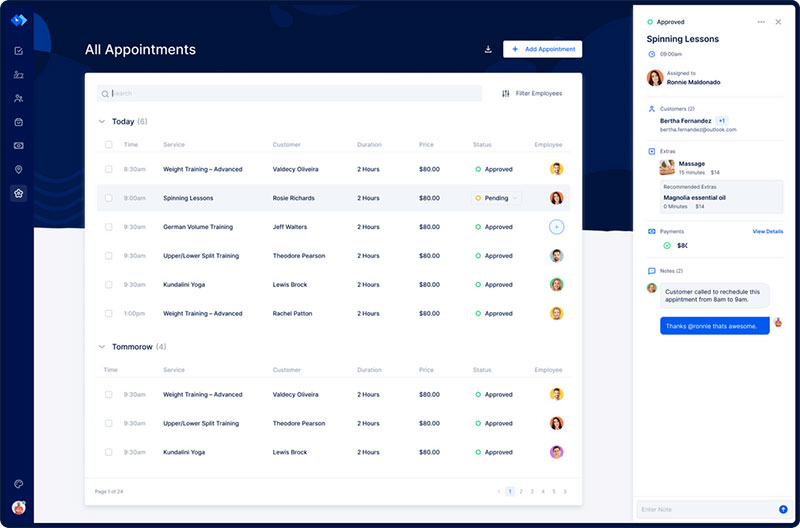As an extremely important function within any organization, mentoring should be flexible. The process must also respect internal standards.
Fostering positive mentoring relationships promotes well-being in all departments. Yet, depending on the line of work, a traditional mentoring program might not be the best option.
Thus, it is necessary to assess, first, the objectives established by the company, and second, the circumstances and purposes of both mentors and mentees.
Choosing a method according to this information produces the best results. Below, you will find 17 types of mentorship to consider. But first, find out why knowing various mentoring programs can make a real difference for your business.
Why Learn About Different Mentoring Programs?
Mentoring is a whole process, not a single role. It involves teaching, counseling, advising, listening, and so on. Like coaching, it aims for both professional and personal development.
But the point is not to work on a few target areas over a short period. You want to establish a long-term relationship to achieve a range of specific objectives.
Consider the differences between individuals and also between businesses. After all, each company has a specific purpose, defined goals, and standards to reach.
Mentoring programs must obey these criteria to offer actual benefits to an organization. The focus is on the development and growth of the mentee. So, you should use methods that encourage them to reciprocate.
Be flexible to their needs and ambitions while holding them accountable for their progress. Follow a structured mentoring program. This way, you can keep an organized schedule and provide efficient support for your mentees.
It is valuable to know different types of mentoring and their characteristics. Doing so will offer you the power to improve your company. Introducing more flexible programs increases employee retention and satisfaction.
Members of staff want to be seen as human beings, not machines. You must show appreciation to each worker. Cultivating successful mentoring relationships is a fantastic way to do that.
Continue reading to discover 17 different types of mentoring you should know.
The 17 Types of Mentoring You Should Know
The following methods can help you understand how to adapt mentoring programs for your company. They range from traditional to more innovative approaches.
Keep an open mind to the idea of blending several programs and strategies. This way, you can create defined, flexible solutions to produce excellent outcomes.
According to the Number of People Involved
One-on-one Mentoring
A one-to-one mentoring program is an opportunity to gain more support and progress. Since there is one mentee for each mentor, it is easier to adapt and plan according to their needs and goals.
Mentees have a unique opportunity for career mentoring. They may prefer to choose a mentor or match with a more experienced employee by enlisting a program.
Where and when to meet, what to talk about, and how to track growth are all joint decisions. In addition, the mentor also becomes a sounding board for the mentee. They can share and develop new ideas and methods to give the mentee more confidence.
Throughout this process, they approach their concerns and handle the recurring challenges together. The program provides continued assistance and counseling. Thus, this type of mentoring tends to generate long-lasting relationships.
Group Mentoring
Group mentoring involves pairing several mentees, whether on the same level or not, with only one mentor. There is an organized schedule for meetings and debate subjects.
A group setting has many advantages. It promotes other types of mentoring, such as peer and reverse methods. It also allows everyone to share their thoughts, experiences, and opinions.
Although this method can be a great opportunity, it presents some difficulties. Matching each person’s availability and meeting their struggles can be a challenge.
Hence, it is helpful to pair group mentoring with a one-to-one plan. The mentoring program should include regular meetings with each mentee to offer the necessary support. So the mentor will have a chance to work alongside them.
Team Mentoring
In a team setting, several mentees join multiple mentors to discuss goals, viewpoints, and experiences. This method allows for more proximity among senior and younger employees.
Establishing a system like this promotes the natural arising of other mentoring relationships. As staff members get to know each other, they find common backgrounds, traits, and work methods.
Team mentoring helps to promote diverse organizations in a healthy and balanced way. Merging so many different people generates productive brainstorming opportunities.
With more than one mentor, it is easier to approach personal hardships and provide efficient aid.
Your mentorship success story starts with a scheduling app to streamline your calendar
Staying organized has never been easier.
You can now manage your business and grow your brand with a single, powerful software that keeps all of your appointments in line, your clients organized and your business booming.
Trafft is perfect for business owners who need to streamline their booking experience both for their staff and their clients.
Trafft handles everything for you, even sending automated email or SMS reminders to your clients. No-shows? Not anymore!
The Trafft booking software adapts to different industries for a blissful online booking experience and employee management.
Want to know more? Check out Trafft's awesome features to see what you are missing.
According to the Approach
Traditional Mentoring
Traditional mentorship is the most used and known method. During your life, you meet many people who will play this role. They are teachers, someone on a managerial level in places you have worked in, and colleagues who have had your current job.
In a business, a traditional mentor is usually a senior individual with specific technical skills. They accompany a younger employee from onboarding and through their path within the company.
Pairing senior staff with new hires is beneficial for a company. It creates opportunities for reverse mentoring. So young people also have the chance to share their recently acquired knowledge.
Sometimes, these mentors become close friends with their mentees. They can advise them even when they are no longer working together or for the same organization. They keep up with each other’s moves and progress and encourage each other to grow.
It is significant to highlight that you will meet new mentors in each stage of life. You can turn to each one for advice or guidance in a specific area. They will be there for you when you face different challenges.
Formal or Informal Mentoring
You have been dealing with informal mentoring your whole life. People who care about you and make use of opportunities to help you grow were all informal mentors.
Remember when your parents and other family members supported or taught you something new? Or when some of your colleagues helped you overcome a hardship or challenge?
Even when you ask advice from a wise friend, you become their mentee for a short while.
A formal mentoring program is different. It demands an organized plan and, as such, is not spontaneous.
But professional development requires discipline. Hence, for a business, this formal method becomes a better option.
Another benefit is that formal mentoring does not allow for partiality. It is not dependent on a knowledgeable employee to care for a new staff member to start training them.
No matter which types of mentoring you apply in your company, you will have to choose between a formal or informal approach.
Competency-based Mentoring
This approach to mentoring seeks to support the development of social or technical aptitudes within a short period. Mentees can build a set of abilities that apply to their professional and personal life.
It is an opportunity to deepen their knowledge and master their interest areas. They can improve their leadership skills and public speaking powers. Or they may opt to learn how to use software to automate tasks and ease their workload.
Competency-based mentoring is one of the most rewarding types of mentorship. It is beneficial for the mentee and also for businesses that profit from having more skilled employees.
By using this method, you improve job satisfaction. You also create a talent pipeline that gives your company the stability and strength needed for a sustainable evolution.
Coping Mentoring
In the last few years, there has been an increase in awareness of the importance of psychological safety and well-being. For companies right now, having coping mentoring programs is becoming a necessity.
These systems seek to provide employees with techniques to help them handle stress and other challenges. Sometimes they deal with both personal and professional issues.
Being vulnerable can be difficult for them. But when they resort to a mentoring program, they feel empowered to keep fighting.
Choose a mentor who knows how to listen and strives to understand other people’s concerns. You should find someone with specific knowledge and training in this area.
It is crucial to encourage workers within the work environment to make the best of this resource. They must develop a support system to stay productive and uphold good mental health.
Virtual Mentoring
Of all types of mentorship, a virtual program is the most flexible. Since meetings occur through digital means, there is no need for the mentor or the mentee to be in a specific location.
The world is recovering from the effects of the COVID-19 pandemic, but some changes are here to stay. Remote working opportunities, for example, continue increasing every day.
Mentoring software and learning management systems are improving. So, companies can expand and recruit people from all over the globe.
New employees need help to adapt. A mentoring program can help them perform better at their functions and make consistent progress.
Another advantage of distance accompaniment is inclusivity. Using meetings to introduce people from other places and backgrounds enriches training. It is also a way to encourage peer mentor dynamics among staff members that work exclusively from home.
Enlarging their perspectives will help employees see new growth opportunities. They will be more motivated and proficient.
Flash Mentoring
Flash mentoring is the best method to improve skills within a short period. Usually, it involves single meeting programs that focus on a specific ability.
There is less commitment in the long run, but a more on-point agenda to ensure goal achievement.
A mentor working in this area must provide deep knowledge-sharing meetings. They should approach whatever issues their mentees face with logic and professionalism.
Providing flash programs generates better financial returns for businesses. Employees can develop and apply the skills they get right away. So the company feels benefits almost instantly.
This type of mentoring provides a perfect opportunity for virtual mentoring. But it also allows employees to weigh the benefits of a longer mentoring relationship.
Reverse Mentoring
Reverse mentoring programs are excellent for career development, because they promote an interchange. Younger employees have up-to-date skills that are helpful in many different areas.
An experienced employee understands how a company works. With time, they have gained expertise and built techniques to perform better at tasks.
Reverse mentoring generates a knowledge-sharing relationship through which both workers can grow. It eliminates the barrier that sometimes forms between generations.
Promoting mutual comprehension also produces better workplace interactions. It can increase employee retention, especially among junior team members.
A reverse mentor has a unique role within an organization. They should have the abilities necessary to help mentees become top performers, but likewise maintain an open mind to the idea that the mentee can teach them something too.
To raise future leaders, you must promote constant, healthy communication between staff members.
According to the Identity of the Mentor
Affinity-based Mentoring
Affinity-based mentoring relationships are crucial for career development. What bonds the mentor and mentee together is a common trait or characteristic. Something they have struggled with during their lives, but which can become an advantage over time.
The mentor can share their experiences, challenges, and ways to overcome them. They assist the mentees as they turn their unique attributes into growth propellers.
Despite having common qualities, both parties might not be able to fully relate to each other. So, it is beneficial to encourage reverse mentoring opportunities within these relationships.
This type of mentoring allows employees to identify with others. They will feel represented in the organization. Companies should use all opportunities to invest in ethnic and gender-diverse leadership development.
Aspirational Mentoring
Consider all the people in your life whom you esteem. You admire their career, work methods, personality, or skill set. Either way, they inspire you to improve. By their example, they show you how you can be better.
Maybe these are not people you have much contact with. Sometimes you do not have them as your friends, but you know what they have accomplished or how they behave.
Aspirational mentors are role models. You learn by observing them. They teach you how to handle situations with the outcome in mind. And they are examples of what you expect to become one day.
Having such workers as mentors in a business is valuable. It motivates new employees and trainees to create a clearer picture of their goals. They will understand which characteristics to develop and how to expand their abilities.
Cross-functional Mentoring
Cross-functional is the most uncomplicated mentoring relationship to cultivate. It is also one of the most beneficial for career development.
Connecting people from different departments and levels within your company leads to improvement. It fosters other types of mentoring, so staff evolves with little cost to your business.
A cross-functional mentor is someone who helps colleagues from other departments. They present subjects from unique perspectives and new solutions. It is very beneficial for problem-solving situations. Enlarging your teams’ viewpoints is essential for success.
Sustain cross-functional mentoring opportunities to help your employees develop a strong contact network. Doing so eases cooperation and promotes unity and continued progress.
Identity-based Mentoring
Identity-based mentoring is one of the most popular types of mentorship right now. It comes from the need to acknowledge each employee as an individual with a relevant background, culture, identity, and their own habits.
This mentoring program is especially helpful to raise employee engagement. It promotes a healthy atmosphere in ethnically diverse and gender-diverse organizations.
The approach involves pairing mentors with the same cultural experience as their mentees. So staff members can feel they matter to the organization. Whether they are a senior person or a part of the new hires, representation has a tremendous impact on each worker.
It also promotes respect among colleagues, a crucial aspect of any workplace. Employees identify with one another. Because of that, this type of mentoring also improves the workplace environment.
By supporting a diverse workforce, you will generate an incredible knowledge-sharing dynamic. Employees who feel free to express creative ideas and innovative concepts move companies forward.
Parasocial Mentoring
Parasocial mentoring is not a toxic relationship. This term refers to a one-sided mentoring relationship, since a parasocial mentor does not bond with you.
They do not know they are helping you since they aim to help many people, sometimes all over the world. These mentors can be YouTubers, Instagrammers, or Bloggers who post regular online content.
They talk about situations they, or other people they know, have been through. They narrate those experiences and describe how they overcame them. Sometimes they invite others to comment on different subjects and give reliable advice.
A mentoring program like this has the unique advantage of always being available. It can help you understand that you are not alone in any situation you might go through. And it arms you with techniques and skills that have already proven to work in other cases.
Peer Mentoring
Your mentors do not need to be your hierarchical superiors. They can be someone on the same level in their career development. Someone that shows you different perspectives. And with their help, you can improve your current performance.
By acting in much the same way, you can become a peer mentor for them. You can share research, knowledge, work methods, and experiences.
You may prefer to schedule and organize sessions for mentoring each other. Applying informal mentoring methods as the need arises is also a viable option. But what matters most is that you maintain accountability and track progress regularly.
Peer mentoring relationships develop into friendships that last for decades. Both will always have a person to celebrate their conquests and achievements with them. But they will also support each other when facing shortfalls and challenges.
Promoting these bonds helps companies fight excessive competitiveness and rivalry. It generates unity, efficient cooperation, and stability within teams.
Subject-matter-expert Mentoring
Subject-matter-expert programs follow the lines of formal mentoring. They evolve in a professional setting.
The mentor has extended experience in a specific knowledge area. This vast understanding enables them to support others who are less skilled. Because of that, they do not need to be at the business for a long time.
Companies might want to include subject-matter-expert plans in their career mentoring programs. Employees can clarify their doubts and master new skills and techniques.
Some staff members will feel encouraged to become experts themselves. So your business will have an even more significant advantage.
Conclusion on the Types of Mentorship You Should Know
Mentoring can improve all aspects of any organization. It is a process that benefits each employee on personal and professional levels. Each team becomes more stable and proficient.
Providing support for your workforce can do more than promote their career development. Staff members will evolve into motivated, valuable individuals in your business.
Each approach to mentoring has specific advantages and characteristics. Mentors may also choose to adjust methods according to their mentees and circumstances.
Even for a new company, investing in creating mentoring programs is very compensating. Studies show that businesses applying different types of mentoring achieve financial returns faster.
Keep organizational goals in mind and aim to understand your employees’ objectives. Then, consider the types of mentorship in this article. You can adapt different program types to generate the best solutions for your business.
If you enjoyed reading this article about types of mentorship, you should read these as well:
- The Many Types of Life Coaching Businesses You Can Start
- How to Get into Personality Coaching and Be Good at It
- The Best Guide on How to Make Money as A Life Coach







